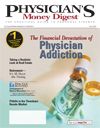Publication
Article
How to Approach a Physician in Crisis
Author(s):
Addiction in physicians is a very serious illness with profound implications for one's medical career and personal and family life. Physicians may struggle with chemical dependence (eg, alcohol, narcotics, or cocaine) and nonchemical dependence (eg, pathological gambling, sexual addiction, or cyberaddiction).
Undiagnosed and untreated, addicted physicians can face a series of cascading losses: medical license, financial security, professional stature and reputation, family and friends, and health, including death by innumerable medical disorders and suicide. But there is good news: We have more knowledge of the genetics, neurobiology, and psychosocial underpinnings of the disease; physicians are being diagnosed earlier than in the past; and the 5-year prognosis with state-of-the-art care is very good.
As colleagues of a physician with addiction, what can you do? The following are some steps you can take:
- Take any evidence of overuse of alcohol, other drugs, or nonchemical behavior seriously.
- Make at least one attempt to reach out to the physician. This must be done privately and with concern and compassion. It is important to itemize in a clear way what you have observed and what you're worried about. Offer to assist with a route to care. If you are dismissed or rebuffed, do not take it personally. In fact, this may be diagnostic, and means you need to proceed to the next step.
- Keep in touch with your colleague while they are undergoing assessment and rehabilitation. Your caring support and continued acceptance will mean a lot and helps to diminish the sense of stigma and isolation.
Michael F. Myers, MD a clinical professor in the Department of Psychiatry at the University of British Columbia in Vancouver, Canada, is a specialist in physician health and the author (with Carla Fine) of the newly published book, Touched by Suicide: Hope and Healing After Loss (Gotham/ Penguin; 2006). He is the past president of the Canadian Psychiatric Association and welcomes questions or comments at myers@telus.net.
